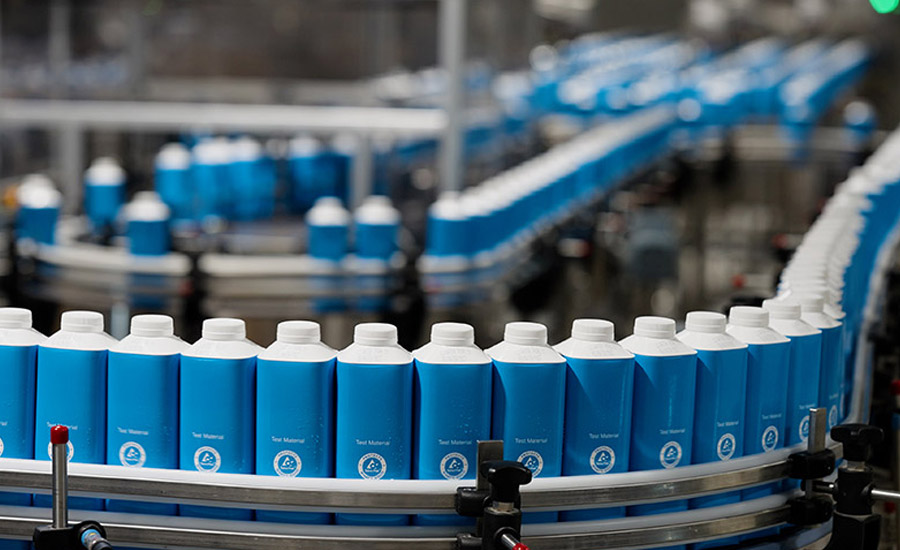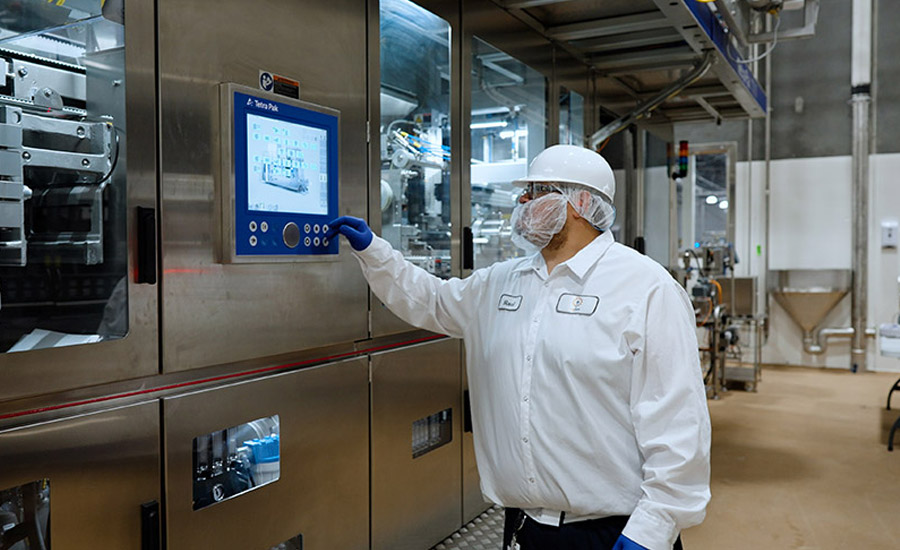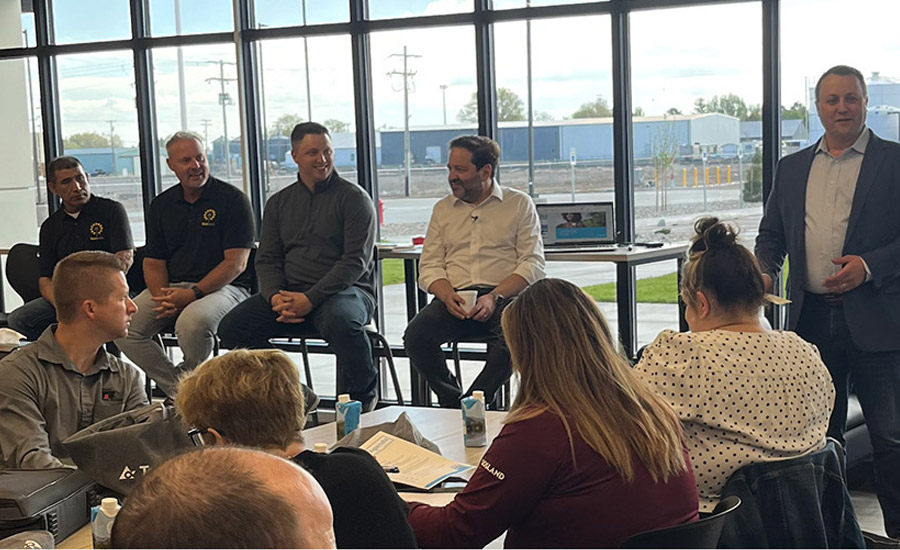Inside the Plant at Suntado’s new co-manufacturing, shelf-stable milk plant in South Central Idaho
Aseptic cartons from Tetra Pak lower carbon footprint, eliminate need for refrigeration.

As a vertically integrated Class 1 and Class 2 milk processing company, Suntado offers extended shelf-life (ESL) and ultra-high temperature (UHT) aseptic dairy and plant-based beverage co-packing solutions in Burley, Idaho.
Photo courtesy of Tetra Pak.
With nine years at BNP Media, parent company of Dairy Foods, I relish that there’s always something new and exciting to learn about in the multifaceted, $4.5 trillion food and beverage industry.
This especially rings true when covering trade shows, visiting cheese or cultured dairy processing plants, or when companies invite us to get a firsthand “look under the hood” at their production and filling lines, new products, and packaging capabilities.
In the case of this media visit, Dairy Foods learned how one fluid milk contract manufacturer, in partnership with Tetra Pak U.S. and Canada, is collaborating to meet surging demand for aseptic/ultra-high temperate (UHT) and extended shelf-life (ESL) beverages that provide a sustainable solution for the dairy industry’s pressing challenges.
I was part of the first media team asked by Burley, Idaho-based Suntado LLC, a contract manufacturer that produces dairy beverages like white and flavored milks, coffee creamers, heavy whipping cream and cold-brew coffees and alternative plant-based products, to tour its sustainable 190,000-square-foot dairy processing plant in mid-May. This was just a few weeks before the plant fully opened its doors for commercial business in June — fittingly, National Dairy Month.
“That’s one of the things that’s unique about being in the co-packing business, we represent everything that a brand is. From a compliance standpoint, our customers know that we ‘dot all the i’s and cross all the t’s’ to ensure that we’re making the highest quality products at competitive prices.”
— Tory Nichols, Office of the CEO, Business Development at Suntado
Suntado offers ESL and UHT aseptic dairy and plant-based beverage co-manufacturing solutions in a sparkling, cutting-edge facility equipped with the latest technology and expertise to meet the needs of dairy and non-dairy companies. It uses primarily renewable materials, including recyclable, roll-fed Tetra Pak, and Evergreen packaging to ensure the highest standards of quality and sustainability.
Dairy Foods was able to see firsthand the state-of-the-art, automated equipment filling milk from local dairy farms into ESL Tetra Pak cartons (which have 90 to 120 days of shelf life) and to grasp the complexity of designing and building an aseptic beverage facility from the ground up.
On the Tetra Pak U.S. and Canada side, attendees were warmly welcomed by the engaging Seth Teply, President and CEO; Larine Urbina, VP of Communications; Mat Rutz, VP of Contract Manufacturing; and Pedro Goncalves, VP of Marketing.
Suntado hosts who discussed the “why” behind Suntado: past, present, and future were the amicable Tory Nichols, Office of the CEO, Business Development; Russ Lucas, Plant Manager; and Jesus Hurtado, dairy farmer and co-owner of Suntado.
As a contract manufacturer, Suntado offers a wide range of co-packing capabilities for aseptic UHT and ESL organic and conventional dairy milk in plain 1% and 2% varieties, lactose-free options, and indulgent flavors like chocolate, strawberry, and vanilla. Suntado also can produce half & half, creamers, cold-brew coffees, heavy whipping cream, and ready-to-drink (RTD) nutrition shakes that “deliver and retain exceptional taste and quality,” Nichols says.
The dairy plant of the future
Both companies share what makes the Suntado and Tetra Pak collaboration sustainable, innovative, and transformational.

First, Suntado is leveraging the innovation and expertise of Tetra Pak, a multinational food and beverage global packaging company founded in 1951 in Lund, Sweden. With its U.S. and Canada headquarters in Denton, Texas, Tetra Pak cartons are exclusively made from Forest Stewardship Council (FSC)-certified paperboard cartons — on average, a combination of 70% paperboard, 25% plastic, and 5% aluminum — that allow liquids to retain its color, texture, taste and nutritional value for up to 12 months, without the need for preservatives or refrigeration, the company says.
Second, Tetra Pak cartons are available in two main types: the “aseptic” rectangular cartons with folds on the top that are commonly used for soups and nut milks; and the “gable-top” carton that functions like a regular milk carton and contains, on average, 80% paper and 20% polyethylene (PET).
Third, more than 193 billion Tetra Pak packages worldwide were sold in 2022 and 1.2 million tonnes of carton packages were collected and responsibly recycled. Since 2019, the company has reduced greenhouse gas emissions across its value chain by 20%.
Fourth, with a brand promise of “Protects What’s Good,” Tetra Pak’s sustainable packaging solutions such as its Tetra Brik Aseptic 1000 Edge and the Tetra Prisma Aseptic package are some of the shelf-stable packaging solutions Suntado is using for its many dairy and non-dairy products.
The use of Tetra Pak is helping Suntado to elevate itself above the competition because products stay fresher longer without refrigeration, saving money in both distribution and transportation costs.
“Tetra Pak and Suntado are innovating together. Shelf-stable products are one of the most exciting ways Tetra Pak is helping to move the beverage and dairy industry forward,” Teply tells media attendees. “With a longer shelf life and no need to refrigerate until opened, shelf-stable dairy products support the transformation of food systems by increasing access to safe food and reducing food waste. We’re excited that Suntado chose to work with us to create the innovative dairy and beverage facility of the future.”
Nichols also shares his excitement at working with Tetra Pak and the originally “crazy concept” for building a vertically integrated Class 1 — milk used in whole, reduced fat, low-fat and nonfat milks — and Class 2 — milk going into “soft” manufactured products such as creamers, half and half and heavy whipping cream — dairy processing plant in South Central Idaho.
In fact, the impetus for the dairy plant stems from a 2018 conversation between second-generation farmers, father and son, John, who passed away in 2019 at age 71, and Dirk Reitsma, owners of Sunrise Organic Dairy, and Jesus Hurtado, dairy farmer and owner of Hurtado Dairy.
“Then, a year later, they’re confident they want to create a plant, an aseptic beverage facility. They were going to call it Greener Pastures,” Nichols tells Dairy Foods. “Fast forward three years and we’re sitting in an airport lounge where they’re presenting this cool, crazy idea to me, Mike Ziegler and Jeff King, and asked if we could help them. And we said, ‘Sure, let’s give it a shot,’ and about four months after that conversation, we created a new brand: Suntado.”
Officially registered as an LLC in January 2022, Suntado combines the “Sun” in Reitsma’s dairy’s name, while the “tado” is part of Jesus’s last name and dairy. Suntado is located in the heart of the Magic Valley, the South Central Idaho’s agricultural region within the Snake River Plain, that comprises rich farmland in Blaine, Camas, Cassia, Gooding, Jerome, Lincoln, Minidoka and Twin Falls counties. Both dairies are located in Jerome, Idaho.
Milk and dairy products are essential to one’s health and nutrition. According to WorldAtlas, there are 9.3 million dairy cows in the United States, with the dairy industry employing around 150,000 people.
When it comes to what state produces the most milk, California is No. 1 on the leaderboard, followed by Wisconsin and Idaho. In fact, Idaho is the third largest dairy producing state in the U.S. with 376 dairies, nearly 700,000 cows and 19 dairy processing facilities.

Thanks to Suntado LLC and owners Reitsma and Hurtado, the “Potato State” now boasts 20 dairy processing facilities.
Additionally, it’s the farm-fresh milk supplied by Hurtado Dairy and Sunrise Organic Dairy that are causing the wheels of innovation to churn at Suntado.
Consider the sheer numbers. Under Jesus’s guidance, Hurtado Dairy produces a remarkable 2 million pounds of conventional milk daily. This achievement is made possible through the operation’s eight advanced milking barns, housing a robust herd of 30,000 cows on a 5,000-acre farm run by more than 300 employees.
Speaking at the mid-May media event, Hurtado laughs when he says he is much more comfortable around his cows than public speaking. He tells the audience that he began his 30-year career as a milker, slowly learning the nuances of dairy farming before becoming the proud owner of his self-named dairy farm in 2007. He notes that he is FARMS Certified, and is dedicated to responsible and ethical practices to produce the highest quality milk.
Reitsma, on the other hand, employs more than 100 workers on one of the country’s largest organic milk-producing farms, yielding approximately 400,000 pounds of high-quality organic milk daily. The 5,500-acre farm encompasses two state-of-the-art milking barns and a thriving herd of 6,000 cows. His visionary approach to dairy farming has earned him certifications in Organic, non-GMO, and Validus.
Honing the skills of Magic Valley Dairymen
Proudly referred to as Magic Valley Dairymen, Reitsma, and Hurtado own 6,000 organic and 30,000 conventional dairy cows, respectively, within 20 miles of the Suntado processing plant, which is located on 23 acres of land at 1240 W. 16th Street in Burley, Idaho.
The farms supply fresh local milk to the brand-new plant which has the capacity to process 800,000 to 1 million pounds of milk a day as it ramps up operations, says Suntado Plant Manager Russ Lucas. The second-generation dairy plant processor notes he grew up around milk sheds watching his dad running plants, processing milk, making and drying cheese, and so on.
He says he was immediately hooked. “As a kid, it’s like, ’Big, loud equipment. That’s cool,’” Lucas exclaims. “As an adult, I kind of realized, ‘Gosh, if I’m looking for a job that’s going to always be there, food is a great place to be.’”

Along with job security, Lucas highlights that the sheer demand of building the plant from the ground up, bringing in millions of dollars’ worth of processing and packaging equipment, and the “stress and excitement that goes with installation and troubleshooting” was an all-consuming process that began when he joined the Suntado team in May of 2023.
“Things didn’t always go great,” Lucas shares. “We got a pump that ran backwards or a valve that fell out, but those first trial runs after we got all the components together and we got to sample some of the milk, ‘Wow, that’s some really good chocolate milk.’ And you get to literally taste the fruits of your labor — It’s awesome!”
The all-important digital design plan
Yet, even before a single wall was raised, the design and engineering of the Suntado plant was about 15 months in the making before the team even broke ground in August of 2022. In January of 2023, concrete was poured for the foundation, in June 2023, framing began, and the site was completed in April 2024. But the work was far from completed because commissioning/certification and initial production runs still had to be completed.
“We knew early on that in order to move fast, we needed a very detailed plan in the beginning,” Nichols explains. “So, we started early on with [architecture and design firm] E.A. Bonelli, RSP Design, and numerous other partners to design and engineer our state-of-the-art facility. We met three or four times a week to see a digital model of the plan and to get numerous perspectives, not just within Suntado, but outside perspectives where we would ask, ‘Hey, is this right? What can be improved upon?’
“So, it took us more than a year to design everything digitally, so we knew exactly that all the electrical was going to be dropped into the right place, where all the drains should be — everything down to the last screw,” he continues. “It took a ton of coordination but I’m so proud of this plant and the team that worked so hard to bring it to fruition.”
Nichols notes that while some co-packing plants also produce their own branded dairy or private-label products and sell them to retailers, that isn’t the case for Suntado. In fact, the co-manufacturer is only handling branded and private-label products so that its customers are 100% confident that what is contained inside and on the carton label/package is correct.
“We’re fully committed to helping brands and private-label products succeed and we have our own quality control methods in place to detect damaged materials early,” Nichols says. He notes that certifications, e.g., QAI certified, organic certified and kosher certified, require Suntado to maintain stringent food safety requirements.
“That’s one of the things that’s unique about being in the co-packing business, we represent everything that a brand is,” Nichols notes. “From a compliance standpoint, our customers know that we ‘dot all the i’s and cross all the t’s’ to ensure that we’re making the highest quality products at competitive prices.”
As a vertically integrated Class 1 and Class 2 company with ample access to regular and organic milk, Suntado provides brands with flexibility, less overhead for product launch and marketing, and no concerns about warehouse storage and distribution. Perhaps most importantly, companies are able to reap the benefits of bringing sterile UHT or ESL products to market quickly.
One of the smaller machines, the Tetra Pak A3/Compact Flex aseptic filling machine has the capability of producing ultra-pasteurized milk in 8.25-ounce Tetra Prisma aseptic cartons — like what is used for school lunches — that require no refrigeration and are shelf-stable for a year. Downstream, these cartons are packaged in multipacks of 12, 18, and 24, Tetra Pak’s Rutz says. The line also can handle non-dairy products, he adds.
Tetra Pak filling and packaging equipment can also process regular pasteurized milk and creamers that stay fresh in the refrigerator for two to three weeks, and extended shelf life (ESL), which require refrigeration but stays fresh for up to 120 days.
Since most of Suntado’s milks are packaged in Tetra Pak cartons, the beverages stay safe for longer periods of time without additives, preservatives, or refrigeration. Not only is this more sustainable, it saves customers money, warehouse space, and transportation costs since refrigeration is not needed and more cartons can be stacked for distribution versus conventional gallon milk jugs, Tetra Pak’s Rutz points out.
Rutz notes that since “mother rolls” are shipped unfinished, they can run side by side on a few lanes or many lanes depending on the format. “There are more packs per pallet that are unfinished. For example, the 1 liter Tetra Brik Aseptic Edge is a great example of a stackable that fits in a corrugated box very efficiently,” he says. “You still maintain considerable savings from a warehousing perspective because of the efficiency and space-saving potential.”
While 95.5% of the plant’s portfolio is focused on dairy products, Suntado is configured with plenty of capacity to evolve and transform the traditional dairy and alternative beverage market.
“We’re a one-stop shop with the capacity to bring higher quality, lower sugar, and high protein beverages to market,” Lucas says.” We’re centered around what our customers want and are here to provide services to help them succeed.”
Nichols concurs Suntado is all-in on meeting the needs of its customers. “As of July, we will have six shelf-stable and ESL packaging lines in phase one of our three-phase project which could have us processing two to three million pounds of local milk a day,” he states. “We currently have five, 60,000-gallon silos containing almost half a million pounds of milk, and we’re set to grow exponentially as our business grows.
“We have the ability to triple capacity in the future and I’m so proud that we offer tolling solutions that cater to a diverse range of Tetra Pak and Evergreen packaging types and sizes,” Nichols concludes. “While it takes a lot of milk to make Class 2 products, I love that we have farmer-owners up to meeting our expansion goals. I love the hard work, collaboration, and innovation that has made Suntado sustainable, transformational, and unique. I can’t wait to see what the future brings.”
Looking for a reprint of this article?
From high-res PDFs to custom plaques, order your copy today!






